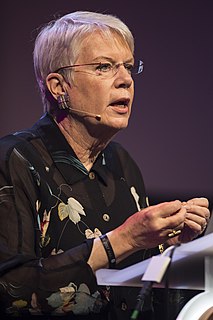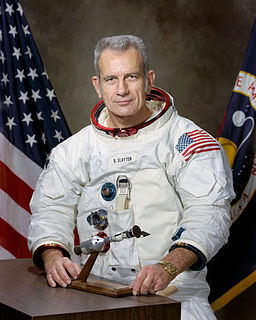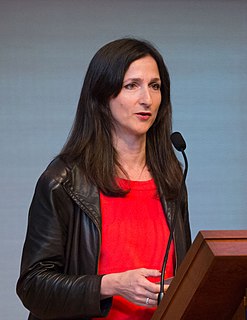A Quote by John M. Grunsfeld
Because of Hubble and other telescopes, we've now discovered that there are probably planets around every star, or virtually every star. There are solar systems around most stars. And the fact that we're here on a planet, Earth, means that it's likely there's lots of other Earths out there.
Related Quotes
The stars associated with the solar system, such as the planets and asteroids (and it should be remembered that the term star in Biblical usage applies to any heavenly body other than the sun and moon) would be particularly likely to be involved, in the view of the heavy concentration of angels, both bad and evil, around the planet Earth.
We are made out of stardust. The iron in the hemoglobin molecules in the blood in your right hand came from a star that blew up 8 billion years ago. The iron in your left hand came from another star. We are the laws of chemistry and physics as they have played out here on Earth and we are now learning that planets are as common as stars. Most stars, as it turns out now, will have planets.
In 1999, my team discovered that the star Upsilon Andromedae was circled by three gas-giant planets - the first distant multiplanet system ever found. That same year, other researchers observed the first 'transit' of an exoplanet - a planet blocking out a small fraction of the starlight as it passes in front of the star.
When I grew up as a kid, we didn't know there were any other planets outside of our own solar system. It was widely speculated that planet formation was an incredibly rare event and that it's possible that other planets just don't exist in our galaxy, and it's just this special situation where we happen to have planets around our sun.
But what exceeds all wonders, I have discovered four new planets and observed their proper and particular motions, different among themselves and from the motions of all the other stars; and these new planets move about another very large star [Jupiter] like Venus and Mercury, and perchance the other known planets, move about the Sun. As soon as this tract, which I shall send to all the philosophers and mathematicians as an announcement, is finished, I shall send a copy to the Most Serene Grand Duke, together with an excellent spyglass, so that he can verify all these truths.
I feel that I'm in on the ground floor of something that human beings will be concentrating on for the next 1,000 years-if we don't destroy ourselves in the meantime. It's possible that 50 years from now we're going to end up out of this solar system, batting around the universe, at least within our galaxy, investigating other stars and other systems.
I don't think discovery of a new planet has a huge meaning for children now, but what it means is the world they're growing up in is very different from children of previous generations. We had Star Trek, Star Wars and Futurama - and we still do - but for children today, they will grow up in a world where other stars were known.
I should say we know that there are many, many other Earths out there. We're almost certain that there will be upwards of a billion Earth-like planets in our galaxy alone, so there is no lack of real estate where life might happen, but what we don't know is how likely it is given the real estate, given a wonderful pristine planet like Earth how likely is it that life will pop up inhabited? We don't know the answer to that.
Always look up! Every time I step out-side, that's the first thing I do. Ask your-self, "what star is that?", grab a star chart and try to figure it out. That is basically how I started. Learn your planets and learn how to distinguish them from the stars. Study star charts even during the day and that night, go and see if you can find them. You may surprise yourself!































